Gallery
 PM Modi visit USA
PM Modi visit USA Only the mirror in my washroom and phone gallery see the crazy me : Sara Khan
Only the mirror in my washroom and phone gallery see the crazy me : Sara Khan Karnataka rain fury: Photos of flooded streets, uprooted trees
Karnataka rain fury: Photos of flooded streets, uprooted trees Cannes 2022: Deepika Padukone stuns at the French Riviera in Sabyasachi outfit
Cannes 2022: Deepika Padukone stuns at the French Riviera in Sabyasachi outfit Ranbir Kapoor And Alia Bhatt's Wedding Pics - Sealed With A Kiss
Ranbir Kapoor And Alia Bhatt's Wedding Pics - Sealed With A Kiss Oscars 2022: Every Academy Award Winner
Oscars 2022: Every Academy Award Winner Shane Warne (1969-2022): Australian cricket legend's life in pictures
Shane Warne (1969-2022): Australian cricket legend's life in pictures Photos: What Russia's invasion of Ukraine looks like on the ground
Photos: What Russia's invasion of Ukraine looks like on the ground Lata Mangeshkar (1929-2022): A pictorial tribute to the 'Nightingale of India'
Lata Mangeshkar (1929-2022): A pictorial tribute to the 'Nightingale of India' PM Modi unveils 216-feet tall Statue of Equality in Hyderabad (PHOTOS)
PM Modi unveils 216-feet tall Statue of Equality in Hyderabad (PHOTOS)India Open Competition in Shotgun, organised by the National Rifle Association of India (N
- Hockey India names Amir Ali-led 20-man team for Junior Asia Cup
- Harmanpreet Singh named FIH Player of the Year, PR Sreejesh gets best goalkeeper award
- World Boxing medallist Gaurav Bidhuri to flag off 'Delhi Against Drugs' movement on Nov 17
- U23 World Wrestling Championship: Chirag Chikkara wins gold as India end campaign with nine medals
- FIFA president Infantino confirms at least 9 African teams for the 2026 World Cup
Explained: How oxygen levels decline in Covid-19 patients Last Updated : 04 Jun 2021 08:30:24 AM IST 
SARS-CoV-2, the virus causing Covid-19, infects immature red blood cells (RBC), reducing oxygen in the blood and impairing the immune response, say researchers.
The study, published in the journal Stem Cell Reports, sheds light on why many Covid-19 patients, even those not in hospital, are suffering from hypoxia -- a potentially dangerous condition in which there is decreased oxygenation in the body's tissues. The study also shows why anti-inflammatory drug dexamethasone has been an effective treatment for those with the virus."Low blood-oxygen levels have been a significant problem in Covid-19 patients," said study lead Shokrollah Elahi, Associate Professor in the Faculty of Medicine and Dentistry at University of Alberta, Canada."Because of that, we thought one potential mechanism might be that Covid-19 impacts red blood cell production," Elahi added.Elahi's team was the first in the world to demonstrate that immature RBCs expressed the receptor ACE2 and a co-receptor, TMPRSS2, which allowed SARS-CoV-2 to infect them.For the study, the team examined the blood of 128 patients with Covid-19. The patients included those who were critically ill and admitted to the ICU, those who had moderate symptoms and were admitted to hospital, and those who had a mild version of the disease and only spent a few hours in hospital.The researchers found that, as the disease became more severe, more immature RBCs flooded into blood circulation, sometimes making up as much as 60 per cent of the total cells in the blood. By comparison, immature RBCs make up less than one per cent, or none at all, in a healthy individual's blood.Further, the team also found the dexamethasone drug suppresses the response of the ACE2 and TMPRSS2 receptors to SARS-CoV-2 in immature RBCs, reducing the opportunities for infection. The drug also increases the rate at which the immature RBCs mature, helping the cells shed their nuclei faster. Without the nuclei, the virus has nowhere to replicate, the researchers said.IANS Toronto For Latest Updates Please-
Join us on
Follow us on








172.31.16.186







